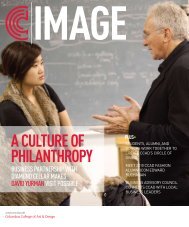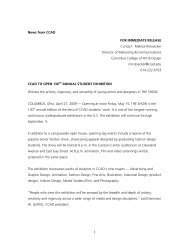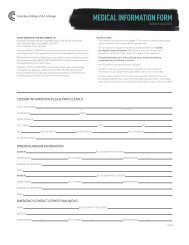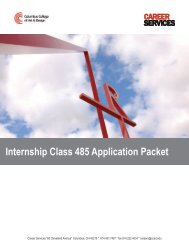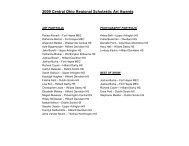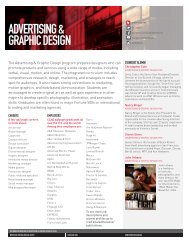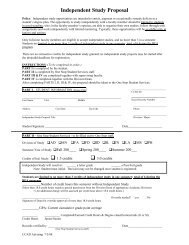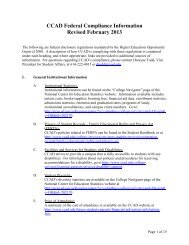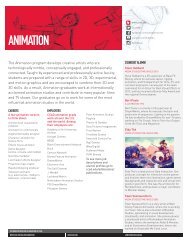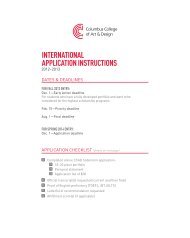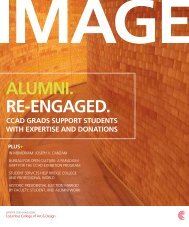STUDENT HANDBOOK - Columbus College of Art & Design
STUDENT HANDBOOK - Columbus College of Art & Design
STUDENT HANDBOOK - Columbus College of Art & Design
You also want an ePaper? Increase the reach of your titles
YUMPU automatically turns print PDFs into web optimized ePapers that Google loves.
<strong>STUDENT</strong> RIGHTS AND RESPONSIBILITIES 17<br />
Note: CCAD has a zero-tolerance policy on graffiti. Anyone<br />
participating in such activities on or <strong>of</strong>f campus will be<br />
subject to disciplinary action up to suspension or expulsion.<br />
SEXUAL MISCONDUCT POLICY<br />
CCAD strictly prohibits sexual misconduct <strong>of</strong> any kind. Sexual<br />
misconduct is defined as any non-consensual contact <strong>of</strong><br />
a sexual nature that is committed through coercion, force,<br />
threats, or intimidation. Consent for sexual contact is an<br />
active state that is informed, knowing, and voluntary. Silence,<br />
in and <strong>of</strong> itself, cannot be interpreted as consent. Actions<br />
that fall under the category <strong>of</strong> sexual misconduct include:<br />
unwelcome sexual advances or requests for sexual favors,<br />
non-consensual sexual touching or contact, including actions<br />
committed through exploitation <strong>of</strong> another’s mental or<br />
physical condition (for example, impairment due to alcohol<br />
or drugs) <strong>of</strong> which the assailant was aware or should have<br />
been aware.<br />
Reporting an Allegation <strong>of</strong> Sexual Misconduct: Students<br />
who believe they have been a victim <strong>of</strong> sexual misconduct<br />
should report this privately to the assistant dean <strong>of</strong> students,<br />
who will inform them <strong>of</strong> their options and assist them in<br />
accessing services. Students may also complete an incident<br />
report or witness statement through the Safety & Security<br />
<strong>of</strong>fice. When an allegation <strong>of</strong> sexual misconduct is reported<br />
to any school <strong>of</strong>ficial, the incident may be investigated by the<br />
college through the student conduct process. The student<br />
who reported the allegation may choose not to participate in<br />
any action taken by the college.<br />
DRUG AND ALCOHOL POLICY<br />
CCAD prohibits the unlawful use, possession, distribution, or<br />
sale <strong>of</strong> drugs, drug paraphernalia, and alcohol by students on<br />
or <strong>of</strong>f the premises. No alcohol is permitted at unauthorized<br />
student events such as student exhibitions. In addition,<br />
alcoholic beverages and containers, whether full or empty,<br />
are not permitted in unauthorized residence hall areas<br />
or classrooms. Students may not be under the influence<br />
<strong>of</strong> alcohol or illegal substances while on college property.<br />
Additionally, students may not be in the immediate vicinity <strong>of</strong><br />
alcohol or other drugs when such substances are knowingly<br />
being used in a prohibited manner.<br />
ACADEMIC MISCONDUCT<br />
Academic misconduct may assume several forms. The most<br />
common are the use <strong>of</strong> unauthorized materials during exams,<br />
acquiring information from other students during an exam,<br />
and plagiarism.<br />
Plagiarism is defined by the following actions:<br />
——<br />
Reproducing another person’s work and submitting it as<br />
one’s own<br />
——<br />
Lifting material from other sources, including the<br />
Internet, to use in assignments without acknowledgment<br />
——<br />
Using another person’s original ideas without providing<br />
appropriate credit<br />
——<br />
Misrepresenting oneself as another individual to an<br />
instructor in the context <strong>of</strong> completing assignments<br />
or tests<br />
——<br />
Co-constructing assignments without the knowledge<br />
and approval <strong>of</strong> the instructor (not to be confused with<br />
legitimate and appropriate tutoring activities, which do<br />
not include actually completing another person’s work for<br />
him/her)<br />
In all cases, if a student is unsure about a question <strong>of</strong><br />
plagiarism or academic misconduct, the instructor should<br />
be consulted. Please consult the appropriate section under<br />
“Disciplinary Procedures,” below, to learn about specific<br />
procedures involved in academic misconduct cases.<br />
DISCIPLINARY PROCEDURES<br />
DISCIPLINARY ADMINISTRATION<br />
The assistant dean <strong>of</strong> students or his or her designated<br />
hearing <strong>of</strong>ficers administer cases involving violations <strong>of</strong><br />
college policies, procedures, and regulations. The Student<br />
Conduct Committee, comprised <strong>of</strong> all current hearing <strong>of</strong>ficers<br />
other than the dean <strong>of</strong> students, may hear certain cases in<br />
accordance with the policies and procedures described in this<br />
handbook.<br />
DISCIPLINARY SANCTIONS<br />
Possible disciplinary actions include, but are not limited to,<br />
reprimands, warnings, probation, suspension, disciplinary<br />
class dismissal, expulsion, fines, restitution, community<br />
service, and others, based on the severity <strong>of</strong> the <strong>of</strong>fense.<br />
DISMISSALS<br />
Students forfeit the right to refund <strong>of</strong> tuition, room/board,<br />
and other charges while under disciplinary suspension, class<br />
dismissal, or dismissal from CCAD.<br />
DISCIPLINARY RECORDS<br />
Records <strong>of</strong> imposed disciplinary sanctions are normally<br />
retained in <strong>of</strong>fices <strong>of</strong> the assistant dean <strong>of</strong> student’s and<br />
within a secure student conduct administration s<strong>of</strong>tware<br />
system. Disciplinary records are not included on the<br />
student’s permanent record with the exception <strong>of</strong> disciplinary<br />
suspension or dismissal from the college.<br />
DISCIPLINARY PROCEDURES<br />
A hearing <strong>of</strong>ficer will initiate follow-up to an incident<br />
or complaint and interview the student to determine<br />
relevant facts. If insufficient information is present or if<br />
the information clearly suggests that the student is not<br />
responsible for the violation, the hearing <strong>of</strong>ficer may dismiss<br />
the case. If the student admits responsibility for the violation<br />
or the information regarding the violation appears to show<br />
obvious responsibility, the hearing <strong>of</strong>ficer may administer<br />
sanctions for the <strong>of</strong>fense without requiring a meeting <strong>of</strong> the<br />
Student Conduct Committee.



